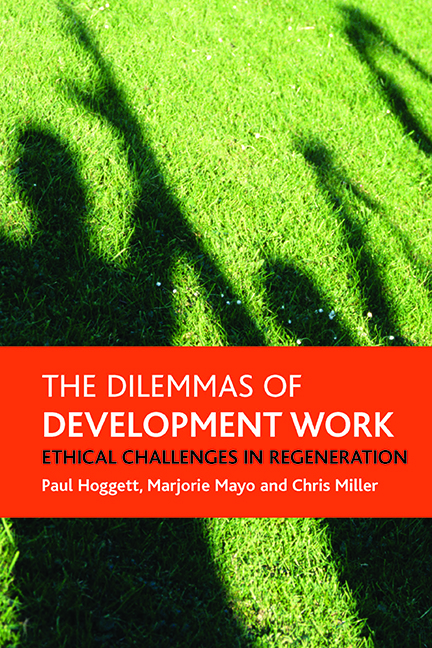three - The nature of development work
Published online by Cambridge University Press: 21 January 2022
Summary
This chapter begins with an account of community development that defines it as a form of state intervention. While the overall focus is wider than community development per se, including a wider range of professionals with a ‘development’ brief, the history of community development has relevance for a critical understanding of the roots and inherent tensions of public policies towards community engagement and community capacity building. As the chapter demonstrates, community development approaches have been applied, and misapplied, in varying ways, over time.
Having explored some of the competing definitions of community development, the chapter then considers the relationship between this and collective action within civil society before exploring the tension between the potential contribution of community development to a more just and equal society and its complex and often contradictory roles in the current context. Community development has long been considered an elusive and contested concept, its purpose difficult to define even by those directly involved in its practice. Indeed, Hoatson (2003, p 23) describes any generalisation as a ‘dangerous practice’. Community development sits on the unstable boundary between state and civil society, both reflecting and seeking to change those relationships (Mayo and Craig, 1995). It embodies values inimical to the dominant commodity relationships of the market that influence our perception of the public sphere and the meaning attributed to development. Its practice is situational and contextual. In Britain it has recently undergone another process of re-branding and is now more frequently referred to as ‘community engagement’, ‘community cohesion’ or more loosely still to a variety of roles associated with combating ‘social exclusion’. Such shifts have expanded the scope of ‘development’, importing the process into the roles of a multitude of welfare professionals, but also diluted the nature of development and the qualities, skills and knowledge necessary to successfully undertake it (Miller, 2004).
As with other professional practices, community development has a history from which has emerged a set of espoused values and a body of knowledge, practices and philosophy (Mayo and Robertson, 2003). Yet these are insufficiently robust, frequently contested and cannot be contained within a regulatory professional body in such a way as to be able to promote and protect a particular position. Further, indeterminate role boundaries create opportunities for practitioners to influence the way development is defined by allowing their own personal identities and values to construct the primary task.
- Type
- Chapter
- Information
- The Dilemmas of Development WorkEthical Challenges in Regeneration, pp. 31 - 54Publisher: Bristol University PressPrint publication year: 2008



